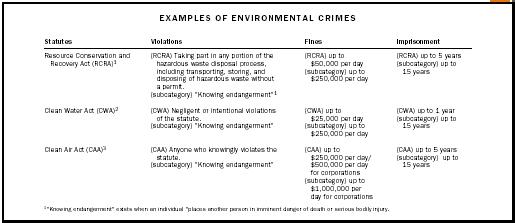Environmental Crime
Environmental crime is a relatively new concept in U.S. and international law; thus, it is still being defined. In a general sense, an environmental crime is any violation of an environmental regulation for which criminal liability may be imposed. Almost all of the major environmental regulations in the United States contain provisions that establish criminal liability under certain circumstances, and most of these liability provisions are mirrored in state statutes. Criminal enforcement of environmental regulations is currently used in only the most egregious of cases, where the actual or potential damages are excessive or where the violator is a repeat offender. Although criminal enforcement actions are mainly taken to deter future misconduct by the individuals charged, their greater impact may be to deter those who are contemplating similar offenses.
Environmental crimes can be perpetrated at any legal level. They may arise out of violations of international, federal, or state laws. Prosecutors can bring charges for such violations at each of these levels. In international cases, U.S. attorneys prosecute violations of federal laws drawn from treaty

| Statutes | Violations | Fines | Imprisonment |
| 1 "Knowing endangerment" exists when an individual "places another person in imminent danger of death or serious bodily injury. | |||
| Resource Conservation and Recovery Act (RCRA) 1 |
(RCRA) Taking part in any portion of the hazardous waste disposal
process, including transporting, storing, and disposing of
hazardous waste without a permit.
(subcategory) "Knowing endangerment" 1 |
(RCRA) up to $50,000 per day
(subcategory) up to $250,000 per day |
(RCRA) up to 5 years
(subcategory) up to 15 years |
| Clean Water Act (CWA) 2 |
(CWA) Negligent or intentional violations of the statute.
(subcategory) "Knowing endangerment" |
(CWA) up to $25,000 per day
(subcategory) up to $250,000 per day |
(CWA) up to 1 year
(subcategory) up to 15 years |
| Clean Air Act (CAA) 3 |
(CAA) Anyone who knowingly violates the statute.
(subcategory) "Knowing endangerment" |
(CAA) up to $250,000 per day/ $500,000 per day for corporations
(subcategory) up to $1,000,000 per day for corporations |
(CAA) up to 5 years
(subcategory) up to 15 years |
provisions. On the local level, state or district attorneys can file charges based on state or local environmental regulations.
Environmental crimes typically involve the unauthorized disposal of hazardous material or discharge of pollutants into the air, water, or ground. In order for such activity to be deemed criminal, the government must usually be able to show that the discharge was not accidental. Most criminal laws require that a prosecutor demonstrate the defendant was aware of the activity for which the charge was filed. Because this requirement is not clearly specified in many environmental statutes, the government has had some difficulty successfully prosecuting environmental crimes. The more extreme the violation, however, the easier it becomes to prove in a court of law that the action should be considered criminal. Several environmental statutes have established a special category of criminal liability in which the "knowing endangerment" of people or the environment has occurred.
The Environmental Protection Agency (EPA) is responsible for coordinating all environmental protection actions at all levels in the United States. Although the EPA is the federal agency that most frequently investigates environmental crimes, Congress has not granted it the power to prosecute environmental crimes. Instead, after an agency official has determined that the violation of an environmental regulation is potentially criminal in nature, EPA issues a recommendation to the U.S. Department of Justice (DOJ) that charges should be filed against the violator. After investigating the case further, a U.S. attorney uses prosecutorial discretion in deciding whether or not to proceed with a criminal case. Several factors are important to the prosecutor in deciding whether the behavior should be considered criminal, including the severity of the actual or potential damages, whether intent has been shown, whether the violator was cooperative, and whether there is a history of similar violations. If the prosecutor decides to file charges, the defendant has the same constitutional rights and protections that are provided in any criminal case.
SEE ALSO E NVIRONMENTAL J USTICE ; ; L AWS AND R EGULATIONS , I NTERNATIONAL ; L AWS AND R EGULATIONS , U NITED S TATES ; T REATIES AND C ONFERENCES .
Bibliography
Sullivan, Thomas, F.P., ed. (2001). Environmental Law Handbook, 16th edition. Washington, DC: Government Institutes.
Clifford, Mary. (1998). Environmental Crime: Enforcement, Policy, and Social Responsibility. New York: Aspen.
Internet Resource
Brickey, Kathleen F. "Environmental Crime at the Crossroads: The Intersection of Environmental and Criminal Law Theory." Available from http://law.wustl.edu/Faculty .
Mary Elliott Rollé
Comment about this article, ask questions, or add new information about this topic: